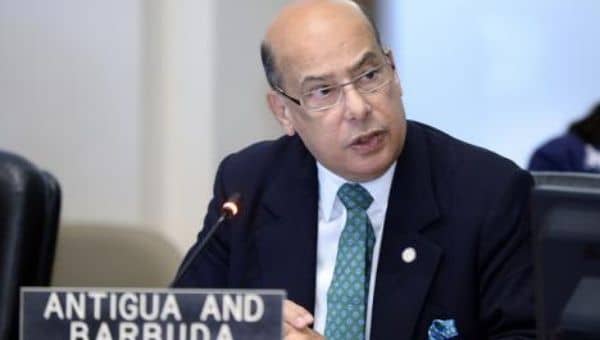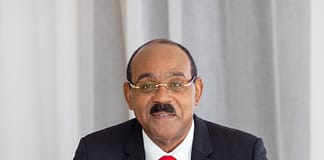
By Sir Ronald Sanders
(The writer is Antigua and Barbuda’s Ambassador to the United States and the OAS. He is also a Senior Fellow at the Institute of Commonwealth Studies at the University of London and at Massey College in the University of Toronto. The views expressed are his own)
The referenda, held individually in Antigua and Barbuda and Grenada, on replacing the British Judicial Committee of the Privy Council with the Caribbean Court of Justice (CCJ) on November 6, were lost for the same reason that Brexit succeeded in the United Kingdom.
The governing political parties in Antigua and Barbuda and Grenada, like the conservative party of then British Prime Minister David Cameron, took a hands-off approach to the referenda.
In Antigua and Barbuda, apart from the Prime Minister, Gaston Browne, the leadership of the governing party played little or no role in educating its electorate about the issue on which they were required to vote. The result was not only a lack of knowledge, but also a lack of popular interest.
Not surprisingly, therefore, only at the voting centres in Gaston Browne’s constituency, was the count in favour of the CCJ as high as 63%.
This absence of direct involvement by the political leadership of the governing parties created a vacuum readily filled by those who opposed a constitutional change that would make the CCJ the final court of appeal for civil and criminal matters. The opponents played upon the lack of knowledge by creating fears.
As in Britain, where just over 50% of those who opted to leave the European Union voted on irrelevant, extraneous issues and lies, the same occurred in Antigua and Barbuda and Grenada.
The arguments offered were many. They were deceitful in some cases, and misleading and willfully inaccurate in others. The saying comes to mind that “a lie is not another side of the story; it is just a lie”.
The worst of the statements was an attack on the integrity of the Court, for which there is no basis. Others included claims that the politicians appoint the judges (the judges are appointed by an independent Regional Legal Services Commission); the judges are beholden to the politicians who pay them (the cost of the Court is met from the proceeds of a Trust Fund established in 2005 and independently managed); the judges are cronies of the politicians in government (the CCJ decisions have been more against governments than for them); replenishing the Trust Fund after 13 years will cripple government’s finances (Antigua and Barbuda and Grenada would pay only 2.11% each).
The ruling political parties in both Antigua and Barbuda and Grenada appeared to have fallen prey to the notion that the referendum should be a matter of free choice, left to “the individual conscience” of the voter. They seemed to have forgotten that the worst condition for making a choice or a decision is one in which the facts are not well known and understood.
It was the responsibility of the political leaders of all parties (opposition and government) to educate the electorate of their nations. They didn’t. While the governments didn’t engage in the kind of necessary political campaigning and groundwork, including house-to-house visits offering explanations and answering questions, opposition elements were creating fears and spreading them. The objective was to give the governing party a bloody nose; a reality about which the hierarchy of the governing parties appeared oblivious.
Little wonder then that the voter turn-out in both countries was shamefully small, and that the larger number of votes cast was by those who had been made to fear the CCJ.
The political leaders seem to have forgotten that the referendum, which was the beginning of all referenda in the Caribbean, failed in 1962 precisely because of the power of fear and lies, and the wrongful belief that campaigning for a cause was not necessary because its rightness was strong enough.
That referendum, of course, was the Jamaica referendum on the West Indian Federation. Alexander Bustamante campaigned vigorously and won on the created fears that Jamaica would be over-run by the “small islanders” (as it turns out, it is the small islands that have witnessed an influx of Jamaicans), and Jamaican taxpayers would have to pay to keep the other islands alive (history has proved differently). Norman Manley did not campaign effectively and lost because of his belief in the rightness of the Federation and saw little need to counter the fears generated by Bustamante.
In each succeeding referendum, wherever held in the Caribbean, the pattern has been the same. Governing parties have neglected the importance of direct political engagement to educate and inform their electorates and to dispel fears manufactured by opposing political parties and other groups with a vested interest.
Just as the 1962 Jamaica referendum determined the Caribbean experience, crumbling the region into small states – each unable to command economic and political attention in a world dominated by the large and powerful – so too have the referenda in Antigua and Barbuda and Grenada injured the region.
What has been injured most is pride and respect for national and Caribbean identity, dignity and self-respect. In Antigua and Barbuda and Grenada, the electorate was misled into believing that by rejecting their own Caribbean court in favour of a court in Britain, they somehow enhanced their own standing.
The worst contributors to this damage to the dignity and identity – the very being of the Caribbean persona – are the political leaders of the opposition parties who either actively told their supporters to vote against the CCJ or pretended to be sitting on the sidelines. They know better. But, for them, the quest for political advantage trumped principle of national honour.
Now it looks like the eight sovereign states of the Caribbean – and their “independent” peoples – will have to wait for the British Privy Council to tell them to go (something that has already been forewarned by Privy Councillors). And what an ignominious way that will be to scurry to the CCJ.
Remarks and previous commentaries: www.sirronaldsanders.com
Advertise with the mоѕt vіѕіtеd nеwѕ ѕіtе іn Antigua!
We offer fully customizable and flexible digital marketing packages.
Contact us at [email protected]

















Yes.History will repeat itself just as in the case of A&B that was propelled by Britain to full political independence in1981 after associate status.So all is not lost as the CCJ President said: “one of the positives that came out of this exercise is that there was sustained public education in both nations (A&B and Grenada)and the conversation about the CCJ intensified.” Further, Justice Saunders said: “As we begin to implement our strategic plan for the 2019-2023,which includes a renewed focus on public education,we will certainly be taking advantage of the increased audience, and the interest that has been piqued to provide more information about the work of the court.” I foresee Britain again propelling all the Caribbean non-member nations to join the CCJ in five to seven years.
“The governing political parties…took a hands-off approach to the referenda. ”
THAT IS A LIE FROM THE PIT OF HELL!!! The so-called education campaign was heavily POLITICIZED and this was a turn-off for many voters. Stop fooling yourself because clearly you will not fool the people of A&B. The government inserted itself heavily into the process (PM pushing for a YES vote and saying he may have to enlist the support of the Labour Party).
I have not read any further beyond that first lie in paragraph 2.
PRINCIPLES OF DEMOCRACY
Sir Ron,
What happens to the fundamental democratic principle that a people reserve the right to determine their destiny.
You might also be insulting the intelligence of the electorate that composes of academics and intellectuals to bluntly state, ‘…the electorate was misled.’
Be careful, you might be singing from a different hymnal. You may see it as ‘…stupidity,’ but
Prime Minister Gaston Browne summed it up correctly.
He said, ‘…The voice of the people, is the voice of God’ [OMG: November 7, 2018].
Even with disappointment, he has not only accepted the results gracefully, but also the principles of democracy which appeared to have been at work.
There has always been a place for these in the life of the nation, and development of its institutions. Yes, there may have been ‘…injuries to Pride and respect for national and Caribbean identity; …dignity; and self-respect’ [Para. 16].
These however, seem no more fundamental than ‘…commonalities of understanding and approach; …unity of purpose; …a good sense of direction; …trust; …confidence and persuasiveness’ in achieving a set goal ‘…Caribbeanizing the Judiciary.’
These appeared to have been woefully lacking in the public awareness strategies and/or exercises.
This seems debatable, but results that ‘…wandered numerically far away from predictive polls and expectations,’ do not think those that participated were all that daft as those that ‘…were snatched from the African Continent’ to become ‘…wise ancestral children.’
REALLY, Sir , Sir!? Political parties hand off approach?!! HERE? WHEN? SURELY NOT ABLP?FOR IT WAS LIKE ELECTIONS!!
IT APPEARS LIKE YOU really have TOO MUCH RESPONSIBILITIES ON YOUR SHOULDERS SO YOU DIDN’T HAVE TIME TO GATHER THE FACTS OR IS IT SINGING?!
REALISE THAT FOR YOUR EYES ONLY CAN NO LONGER WORK SO PLEASE DON’T UNDERESTIMATE OR INSULT OUR INTELLIGENCE.
What’s done is done. Accept the people’s decision and get on with the business of representing ANTIGUA.
Jose Marti reminds us that, “the first duty of man is to think for himself “. We did that despite. .. so stop trying to fool yourself and the world.
Comments are closed.